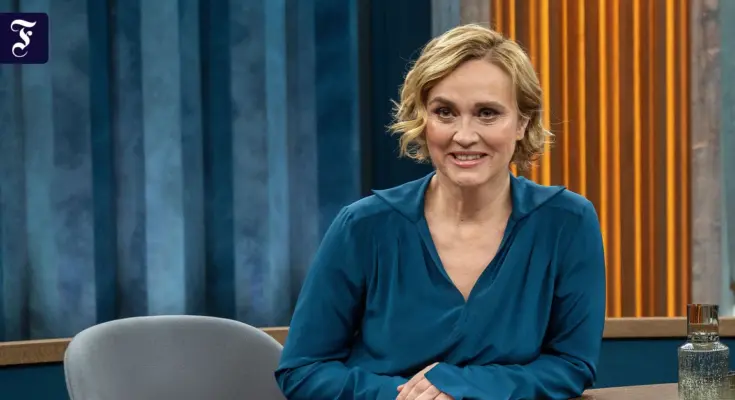As a German talk show guest who’s supposed to talk about the American president’s politics, you have a problem: You sit in the studio and say witty lines, but before they’re fully thought through, Trump’s politics may have changed again – especially when it comes to the Ukraine war. Sometimes Zelenskyi is rudely insulted and thrown out of the White House, then Trump seems to timidly side with Ukraine and Europe and imposes tougher sanctions on Russia than Joe Biden, until after the next phone call with Putin he again praises Putin’s willingness to negotiate and insults Zelenskyi as an ungrateful person, and so on.
There is nothing consistent about Trump’s Ukraine policy except his inconsistency, which tends to make his constant talk shows unpopular. an educated guessevents become a source of real knowledge. Something similar was true for Caren Miosga, who wanted to explain as much as possible about Trump’s “peace plan” for Ukraine on Sunday night. But in the end, he simply reminds Socrates: One knows that one knows nothing.
This does not apply to the outline of Trump’s 28-point “peace plan.” It is clear to Ukrainians and Europeans that this is unacceptable, which is why Ukrainians, together with Europeans, are fighting for it to be adapted again. Throughout Sunday, representatives from Kiev and Washington sat together in Geneva to “revise” it; The results will be announced this Monday. On Sunday evening, American Secretary of State Marco Rubio appeared before the press and said that good progress had been made; Journalists also had the impression that serious negotiations were taking place in Geneva. “Bild” journalist and Ukraine expert Paul Ronzheimer also said on “Miosga” that there were signals from Geneva during the day that the original plan would be significantly changed. The only question is: Clear enough?
“It is inhumane because it means surrender”
One could doubt that. Right at the beginning of the event, the editorial team of “Miosga” showed how bad the initial plans were for Ukraine and Europe. Point 3: It is “expected” that Russia will not attack neighboring countries and that NATO will not expand further. Point 6a: The size of Ukraine’s armed forces will be limited by one third to 600,000 troops. Point 13: Russia is allowed to return to membership of the G7 countries and is exempt from all economic sanctions. Point 21a: The Oblates of Donetsk and Luhansk completely fell into Russian hands. Point 26: All parties received full amnesty for their actions during the war – including massacres such as those carried out by the Russians at Bucha. Russia: Douze Points. However, the “security guarantees” contained in the plan for Ukraine are unclear. The paper is “completely inhumane because it would be a capitulation” – that’s what FDP lawmaker Marie-Agnes Strack-Zimmermann called a roadmap to peace.
In fact, the plan was formulated so unilaterally and benefited Moscow that doubts arose at the weekend about whether it was truly a “Trump plan” or rather a plan from Moscow dictated directly by the Kremlin to Trump’s special envoy, Steve Witkoff, to the bloc. Miosga briefly asked the obvious question of whether there was a “power struggle” brewing between Witkoff and Vice President JDVance against Secretary of State Marco Rubio, who immediately denied that was Trump’s plan. Others were surprised by the coincidence that the plan was thwarted at a time when diverting attention from the Epstein dossier would have been more convenient for Trump than usual.
Laschet is a famously optimistic person
“Bild” journalist Paul Ronzheimer believes that the plan came from Moscow because it was “exactly what Putin always wanted.” Claudia Major, a political scientist and security expert at the German Marshall Funds, doesn’t think it matters where the plan comes from. What is more important is that Europe realizes the dramatic impact it could have on the continent. The US wants to establish a “security dialogue” between NATO and Russia, as if they were no longer members of NATO. “Ultimately, Moscow is trying to control NATO; they want to have a say in it. That would mean a declaration of total bankruptcy.” The plan can only be the basis for lasting peace, Major said, if Russia’s intentions toward Ukraine and Europe have changed. But that’s not the case, “Trump’s” paper “still reflects Moscow’s claims of wanting to control Ukraine and expand it into Europe.”
CDU politician Armin Laschet, once CDU chairman and chancellor candidate and now chairs the Bundestag’s Foreign Affairs Committee, is an optimistic figure in the group. He praised the fact that Europe was “ready to talk” and that the Chancellor sought dialogue with Trump on a “peace plan” before the start of the G-20 summit in South Africa. Ronzheimer, one of the most insightful experts on Ukraine, vehemently opposes this: No, in fact the Europeans are not doing anything, they are just reacting and so far have used little to no means of pressure. Of course, Ronzheimer directly quoted the Chancellor who some time ago had “threatened” Putin that Germany would supply “Taurus” cruise missiles to Ukraine if Russia continued to attack civilian targets. Putin continues to bomb – but Ukraine is still waiting for today’s Taurus. Merz always argues with “If, then!” logic, but did nothing, criticizing Ronzheimer. In doing this, Merz is no different from Olaf Scholz before him: “We will not give Ukraine everything we can.”
High recognition status, no strategy
The entire program ultimately revolves around this sobering realization: If Europe is serious about Ukraine and its own security, then it must do much more. But apparently not. Miosga asked his group why there was no European peace plan. Armin Laschet doesn’t know; In Brussels there is a “high recognition status”, but no real strategy. Why is Europe just on the sidelines, Miss Major? Germany does not need to wait for Europe, he said, Germany can take the initiative itself. Major certainly saw an economic impact on the shadow fleet and on frozen Russian assets, but Berlin did not take advantage of it. Instead, Germany and Europe were mere pawns in the struggle between the great powers: “We are caught between indifference in the US and revisionism in Moscow. Europe cannot make a big difference in the military field.”
So far there is a large consensus regarding hopelessness; There is little difference between the groups when it comes to the question of whether negotiations with Russia are worthwhile. Claudia Major thinks: No, because from Russia’s point of view there is no reason at all to stop the war, as Moscow is making “very slow and bloody” progress on the battlefield, but is still making steady progress. “Russia has always sought to achieve negotiations that cannot be achieved militarily, and the US and Europe are currently at odds. This is a win-win situation for Moscow.” The plan, according to Major, would only cause a lull in fighting that Russia could use to further build up its armed forces.
Laschet and Ronzheimer, on the other hand, are more pro-negotiations as they fear things could get worse for Ukraine if there is no initial deal. Trump gave Ukraine an ultimatum next Thursday to accept the plan – and although he delivered immediately, Miosga also deeply feared that the US would carry out its threat and withdraw from support for Ukraine altogether. “We Europeans cannot replace it, no matter how much we claim,” Laschet warned. “That’s the reality.” Paul Ronzheimer also sees the situation in Ukraine becoming increasingly dramatic, not only because of Russia’s success on the front lines, but also because of the increasing number of deserters, lack of weapons and corruption cases, which puts Zelensky under great pressure. If Ukraine refuses to sign the agreement now and the war continues, the situation in Ukraine in two years may become even more dramatic, Ronzheimer warned.
Ukraine needs “real life insurance”
So what’s next? Even if Claudia Major does not believe Putin is truly interested in ending the war, she believes it is worth trying to revise the “peace plan” and “return responsibility to Moscow.” Laschet also called for the plan to be “sharpened” and, if Putin does not agree, to further increase economic pressure on Russia. “If we say now that Russia won’t do that, then we won’t make any progress.”
The most important question, on which the Miosga group again agreed, is the strongest possible security guarantee for Ukraine. Ronzheimer said that the negotiating group in Geneva was discussing giving Ukraine certain weapons systems such as the Tomahawk – but even that would not be enough of a security guarantee for Ukraine. Ukraine needs “real life insurance,” Claudia Major said, comparable to NATO. At this point we wonder who exactly is supposed to provide this “life insurance” if America under Trump might pull out of Ukraine out of frustration, if Zelensky does not want to sign a total surrender, but Europe and other NATO members also do not act energetically to commit such a breach. But other than greater helplessness, you probably won’t hear anything new there either.
Support from abroad is both a blessing and a curse
Since January, Paul Ronzheimer said towards the end of the event, we could observe how Trump tried in vain to put pressure on Putin. Now he realizes that the pressure on Zelensky had a greater effect. This is not a good prospect – also because rampant corruption in Ukraine is increasingly eroding solidarity with Kiev. Sentiment towards Ukraine could also change in Germany, Laschet warned, and Zelensky should be pressed more firmly to clarify, “the will is already there.” But Laschet also showed his understanding of the “temptation” when “so many billions of people are at play” – something similar happened “even in my own group” when it came to wearing masks during the pandemic. It was a brief but effective domestic political blow against former CDU party chairman candidate Jens Spahn, who then harshly distanced himself from Laschet.
Paul Ronzheimer believes that Ukrainians will not forget that Zelenskyy remained in the country after the war broke out – but they will no longer vote for him when there is peace someday and elections are held again. Ronzheimer believes that Europeans should no longer excuse corruption in Ukraine by saying there is a war going on. “Clarification is urgently needed, but the willingness to clarify in Zelenskji is not very great.” The Ukrainian people want a different Ukraine, and for that they need support from abroad.
Adequate support from abroad: Unfortunately, this is one of the biggest problems for Ukraine.



